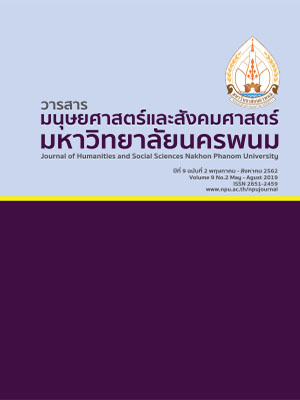The Development Of Trainning Curriculum for Teacher Engaged in the Design of Electronic Book (e-book) in Sakonnakhon Municipality
Main Article Content
Abstract
The objectives of this study were: 1) to develop an e-book production training curriculum, 2) to compare knowledge and understanding of e-book production between before and after the training, 3) to investigate a degree of teachers’ e-book production skill after the training, and 4) to examine teachers’ satisfaction with the training curriculum. A sample was 40 teachers of Municipal Secondary School 3 “Yutithamwithaya” under the Office of Education, Sakon Nakhon City Municipality, Mueang district, Sakon Nakhon province in academic year 2017 thatwere selected by cluster random sampling. The tools used in this study were 1) a questionnaire on the need for teacher development in electronic book production Which had values of IOC 1.0 2) the teachers’ knowledge and understanding of e-book production whose discrimination power values of all individual items ranged between 0.20 and 0.27 and reliability coefficient of 0.71 3) Evaluation forms of teachers’ e-book production skill Which had values of IOC 1.0 4) a teachers’ satisfactionof training participants with the e-book Which had values of IOC were between 0.80-1.00. Statistics used in data analysis were percentage, mean, standard deviation and t-test for dependent samples.
Findings of the study revealed the following: 1) The e-book production training curriculum had 4 components: 1. objectives, 2. substance in knowledge/experience, 3.instructional process, and 4. evaluation. 2) Knowledge and understanding of e-book production after the training was significantly higher than that before the training at the .05 level.3) The e-book production skill was at high level. 4) Satisfaction of training participants with the e-book production training curriculum was at the highest level.
Article Details
References
นักศึกษาระดับปริญญาตรี มหาวิทยาลัยราชภัฏนครสวรรค์. วิทยานิพนธ์ ค.ม. พิษณุโลก: มหาวิทยาลัยราชภัฏพิบูลสงคราม
จารุวรรณ มโนมัยกิจ. (2559, กันยายน–ธันวาคม). การพัฒนาหลักสูตรฝึกอบรมตามแนวคิดการเรียนรู้เชิงประสบการณ์เพื่อ
เสริมสร้างสมรรถภาพด้านการจัดการเรียนรู้สำหรับครูภาษาอังกฤษระดับมัธยมศึกษาตอนปลาย. วารสารมหาวิทยาลัย
นครพนม,6(3),115-122.
ชูชัย สมิทธิไกร.(2554). การฝึกอบรมบุคลากรในองค์การ.พิมพ์ครั้งที่ 7.กรุงเทพฯ :จุฬาลงกรณ์มหาวิทยาลัย.
ทวีศักดิ์ กาญจนสุวรรณ. (2552). เทคโนโลยีมัลติมีเดีย. กรุงเทพฯ : เคทีพี คอมพ์แอนด์ คอนซัลท์.
ทิศนา แขมมณี. (2556). ศาสตร์การสอน. กรุงเทพฯ: จุฬาลงกรณ์มหาวิทยาลัย.
บุญชม ศรีสะอาด. (2553).การวิจัยเบื้องต้น. พิมพ์ครั้งที่ 8. กรุงเทพฯ: โรงพิมพ์สุวีริยาสาส์น.
บูรณะ สมชัย. (2542). การสร้างบทเรียนคอมพิวเตอร์ช่วยสอน (CAI). กรุงเทพมหานคร : ซีเอ็ดยูเคชั่น.
เพชรปราณี อินทรพาณิชย์. (2560, มกราคม-ธันวาคม). การพัฒนากลักสูตรเพื่อเสริมสร้างทักษะการคิดวิเคราะห์ สำหรับนักเรียน
ระดับชั้นมัธยมศึกษาปีที่ 6 โรงเรียนอนุบาลสกลนคร. วารสารมหาวิทยาลัยนครพนม,7(1),99-108.
วาโร เพ็งสวัสดิ์. (2551). วิธีวิทยาการวิจัย.กรุงเทพฯ :สุวีริยาสาส์น.
สมคิด บางโม. (2551). เทคนิคการฝึกอบรมและการประชุม. กรุงเทพฯ : วิทยพัฒน์
สงัด อุทรานนท์. (2542). พื้นฐานและหลักการพัฒนาหลักสูตร. กรุงเทพฯ : สุวีริยาสาส์น.
อรวรรณี ไชยปัญหา. (2556). รูปแบบการพัฒนาภาวะผู้นำทีมของผู้บริหารโรงเรียนขนาดเล็ก. วิทยานิพนธ์ปรัชญาดุษฎีบัณฑิต.
สกลนคร: มหาวิทยาลัยราชภัฏสกลนคร


